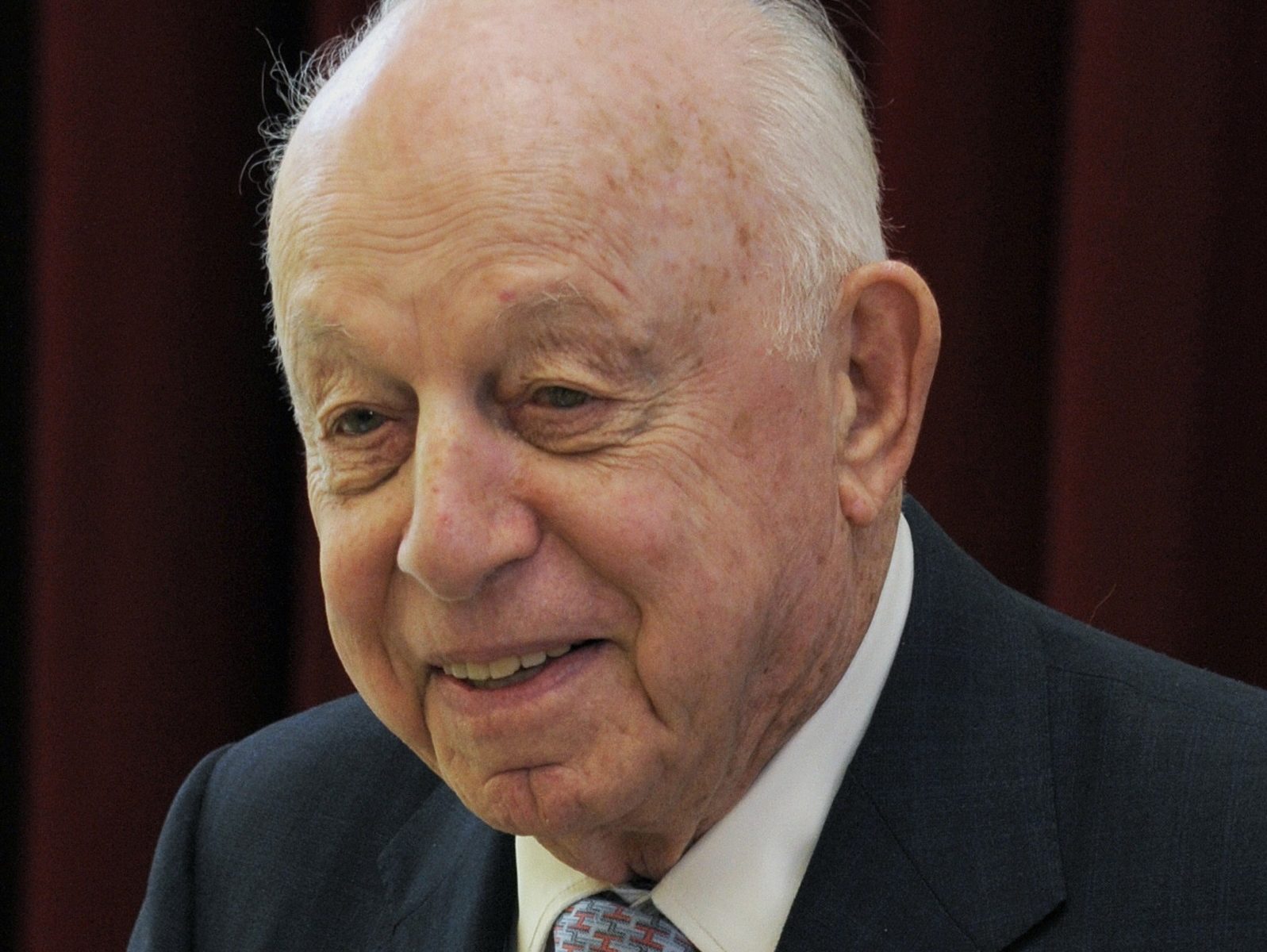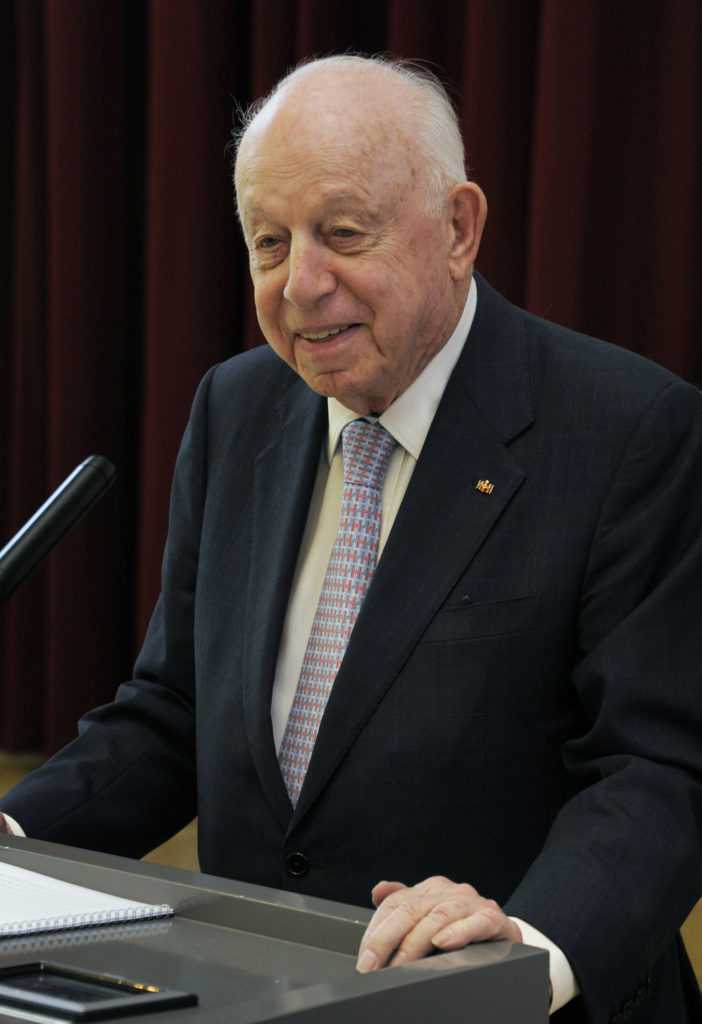Working with Mr. Arnhold
Mr. Henry H. Arnhold died on Friday August 23rd, 2018. He was 96 years old. I met Mr. Arnhold in 1998 when I joined Arnhold and S. Bleichroeder, Inc., a predecessor firm of First Eagle Investment Management. Around that time, he was not actively involved in day-to-day management of the company, and instead focused on managing some family accounts and DEF Associates. DEF was comprised of a fund of George Soros’ Quantum funds, in-house funds, some outside funds, and some direct investments. At that time, Quantum funds were not taking new capital, but traded on secondary markets. Some funds traded at huge premiums to their NAV such as Nick Roditi’s Quota Fund, which carried a premium as high as 80%.
I did not have many chances to talk to Mr. Arnhold in the early days of my career at Bleichroeder. But, as I started becoming involved in allocating capital to outside hedge funds with Tim Tabor, my cousin-in-law, I got more opportunities to talk to him. Every time we found a promising manager, we organized an in-house lunch. We invited Mr. Arnhold and all other in-house portfolio managers. Many well-known managers came to our office to meet Mr. Arnhold such as Paul Singer, Phil Falcone, Bill Ackman, Jim Chanos, Chuck Davidson, etc. We really enjoyed interacting with them. Mr. Arnhold usually called friends in the industry who might know the manager to get some references, which was quite helpful.
Also, we did some special projects for Mr. Arnhold. One of them was investigating why one internal fund performed so poorly. We found out the fund tended to take profits too soon, and stay with losing trades too long. The fund was shut down a few years later. Another project was investigating a private Japanese company of which DEF received shares-in-kind from a liquidating fund. He got a buyout offer for the shares from GE Capital. As I investigated the company (just called them up), I found out the company was developing interesting stylus pens. We decided to keep the position and sold the shares soon after the IPO. The company was Wacom (TSE: 6727). Today, it is still a public company with a market cap of 80 billion yen. I believe we sold it around a market cap of 50 billion yen or 40x EBIT.
One thing I knew about Mr. Arnhold from the beginning was he did not like to be called “Henry”. That was one piece of advice I got right after I joined the firm. One of my colleagues told me, “until he personally gives you the OK to call him ‘Henry,’ you should call him ‘Mr. Arnhold.’” Since he never gave me the OK, I kept calling him Mr. Arnhold. Maybe, he didn’t care how people addressed him as much as we thought. However, I witnessed some young hedge fund managers come to our office to pitch their funds and casually call him Henry. I think such managers never got money from Mr. Arnhold. Also, he hesitated to give money to managers who misspelled “Arnhold and S. Bleichroeder,” which happened more than few times. One manager personalized his pitch book by putting “Arnold and S. Bleichroeder” on the pages. Mr. Arnhold always reminded us the devil is in the details.
Until the very last, he came to the office every day. When I was working there, he usually arrived at the office around 10 am by his Volkswagen Phaeton, which was a gift from the city of Dresden when he became an honorary senator of the university (VW manufactures the Phaeton in Dresden). After checking letters, memos, and news of his portfolio companies, he usually had lunch with guests or employees in a small conference room called Dresden, which was next to his office. After lunch, he usually checked the market close with his Reuters terminal, placed some orders, and left the office around 4:30pm. My father who is 77 years old still comes to office every day. I think that is partially because he deeply respects Mr. Arnhold.
Big supporter of VARECS
Even after I came back to Japan in 2005 and founded VARECS in 2006, I always tried to spend some time with Mr. Arnhold every time I visited New York. During my latest trip to NY in June, I had a chance to talk with him. When I entered his office, he was comparing our results to one of our competitors because the manager was pitching their Japan fund to a school endowment where Mr. Arnhold was a long-time board member. He thought the school should invest with us instead because he noticed our results were much better. I told him he should give money to the manager since I knew him very well and I didn’t want to steal his business opportunity. Then, if the school need one more Japanese fund, they could consider us. He tried to invite me to the school’s investment committee meeting, but unfortunately I had to leave NY the day of the meeting.
Instead, Mr. Arnhold gave us another a few million for our fund from one of his foundations. This happened more than a few times in the past: I stopped by his office and gave him some updates. When I returned to Tokyo, I got an email from his assistant saying Mr. Arnhold was adding some money. Without his support, we may not have survived the financial crisis. He was a big believer in what we do here at VARECS.
I was sad to hear that Mr. Arnhold was asking about my next NY trip schedule to Larry Ioffredo, my long-time business partner and a portfolio manager of Arnhold LLC, on the Thursday before he passed. I guess he was trying to arrange the next investment committee meeting.
Mr. Arnhold’s success in NY
According to the New York Times’ obituary[1] of Mr. Arnhold, he was born on September 15th, 1921 in Dresden. His father and uncles ran a family bank called Gebruder Arnhold. The bank specialized in making loans and investments in industries that other, larger institutions overlooked such as breweries and porcelain producers. The firm used to run the Global Beverage Fund based on the family’s experience of owning a brewery in Dresden back then, which was always profitable, even in bad recessions.
A few years after the bank acquired the better-known S. Bleichroeder in 1931, which provided financial backing to Otto von Bismarck, the newly-merged Arnhold and S. Bleichroeder became the first major Jewish bank to be Aryanized. The family was forced to sell to Dresdner Bank at a depressed price.
Mr. Arnhold then attended boarding school in Switzerland. In 1940, when he was in Norway with a friend, a German security officer arrested him. The next year, he was let out and sneaked across the border to Sweden using forged ID papers. From there, he caught a boat to Cuba, made his way to the United States and joined the army. Thanks to his enlistment, he became the first member of his family to gain United States citizenship.
He joined Arnhold and S. Bleichroeder, Inc. in 1947 when he was 25. Somebody told me that his first title was mail-boy. Next, he was promoted to chairman. I have never been able to confirm this story with him. He was chairman of the firm from 1960 to 2015.
He was a co-portfolio manager with George Soros when the firm launched the First Eagle Fund N.V. in 1967 and Double Eagle in 1969. When George Soros left Bleichroeder, the firm made a deal with him to provide all back-office operations to Soros’ new firm. Also, Double Eagle Fund changed its name to DEF and became a fund of funds. The fund is currently run by John Arnhold, Mr. Arnhold’s son, and Tim Tabor. It is one of the largest investors in our fund.
When I joined Bleichroeder in 1998, it had the Quantum Department, which handled Soros Group’s back-office operations. The operations included the prime brokerage service and I think it was the most profitable business of Bleichroeder until 2000. One of the stories I remember was the firm declined a request from Julian Robertson of Tiger Management to open an account after consulting with their large client. Mr. Robertson thought Bleichroeder must be a great PB since Mr. Soros used it. But, I guess that Bleichroeder had a small capital base and were not comfortable providing leverage to two groups at the same time. When Stan Druckenmiller left Quantum group in May 2000, it sparked some personnel changes that ended the exclusive PB relationship with Bleichroeder. I think this was one of reasons why Arnhold family decided to sell the brokerage operation to Natexis in 2002. The deal had a large impact on my family’s decision to exit our own brokerage business 10 years later.
Mr. Arnhold and Japan
Despite being a holocaust survivor and Japan’s alliance with the Axis powers, I believe that Mr. Arnhold liked Japan. I think this relates to his family collection of Meissen porcelain, which were originally imitations of Japanese (and Chinese) ceramics. The Meissen company had a tough time figuring out the secret recipe of Japanese ceramics, so I think Mr. Arnhold admired Japanese tradition and technology (the Arnhold Collection is regarded as one of the world’s best private collections of Meissen).
He told me he first came to Japan when he was very young to close a deal for Arnhold’s industrial business. He met a generous guy named Mr. Yamamoto on the airplane. Mr. Yamamoto invited Mr. Arnhold to his house and introduced some business people. He kept asking me whether I know Mr. Yamamoto or not. I’ve never been able to figure out who he was, but Mr. Arnhold liked Japan because of Mr. Yamamoto’s kindness.
During the holiday season, some selected employees got a call from Mr. Arnhold. When the employee arrived at his office, he would thank the person for their contribution to the firm during the year and present a tie. I received ties a few times when I worked there, too. One of my embarrassing memories working in NY was wishing Mr. Arnhold a Merry Christmas.
Father – son business partnership
I truly admired the relationship between Mr. Arnhold and John. I think Mr. Arnhold trusted John very much and John respected his father deeply. John joined the firm in the early 80’s as a portfolio manager of the newly-established risk arbitrage team. He moved to the management side in the early 90’s as Mr. Arnhold stepped back from day-to-day management to focus on investments of family accounts and DEF. Although I only witnessed the history of the firm since 1998, it was nothing but spectacular success. Mr. Arnhold must have enjoyed watching John make all the right decisions to grow the firm from a small boutique investment bank to a $100 billion asset manager. John sold a majority stake of the firm to an investor consortium in 2015 at what I personally believe were triple-peaks: peak assets, peak valuation, and peak management fee.
Anyway, there is about 30-year difference between Arnhold father (96 years old) and son (64 years old), and Yasu father (77 years old) and son (me 45 years old). I feel so lucky to experience the ideal father-son business partnership in advance. Now, I have reached John’s age when I first met him in 1998. I don’t think I will achieve anything close to John-like success in the next 20 years, but I will do my best to be productive and build something which will make my father (and hopefully John and Mr. Arnhold as well) proud.
I think John and all members of Arnhold LLC were deeply shocked by Mr. Arnhold’s sudden death. I guess that we all knew Mr. Arnhold was quite old, but none of us ever imagined the office without his presence. My biggest regret was I should have conducted a proper interview with him. I remember he once told me about a deal with Graham-Newman Partners regarding finance for a utility business. Sadly, the details of the deal are not clear in my memory. He also told me how he and Mr. Soros started the first-First Eagle fund. I remembered he came up with the “Eagle” name from Switzerland’s Bank Adler (which means Eagle in German), one of the few assets the family was able to keep in Europe during the war. I also vaguely remember there was an interesting concentration rule at the beginning. I wish I had gotten these points clear, but I thought I had more time with him in the future. Regret never comes first, according to a Japanese proverb. It is hard for me to imagine visiting the Arnhold office with Mr. Arnhold there anymore. I will definitely miss him.
[1] “Henry Arnhold, Patriarch of a Storied Banking Family, Dies at 96” by Emily Flitter, New York Times, 2018 August 29. https://nyti.ms/2MA1vWS


